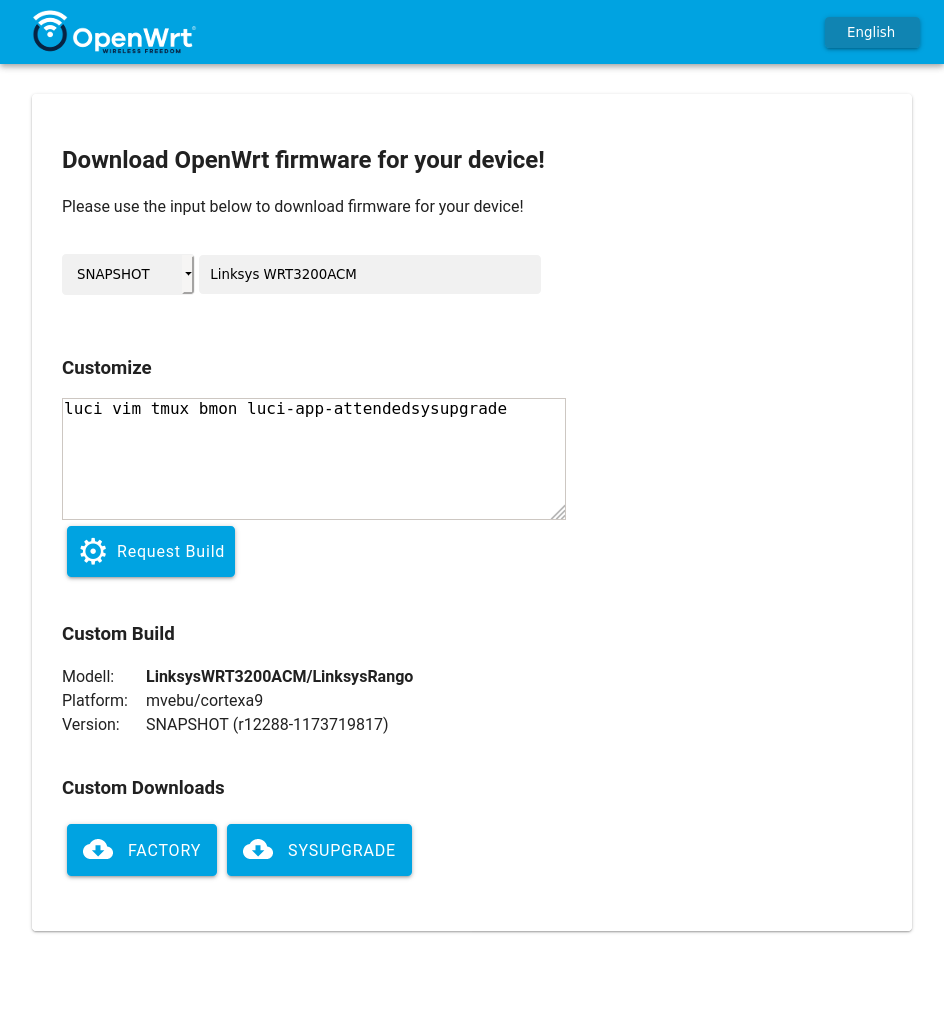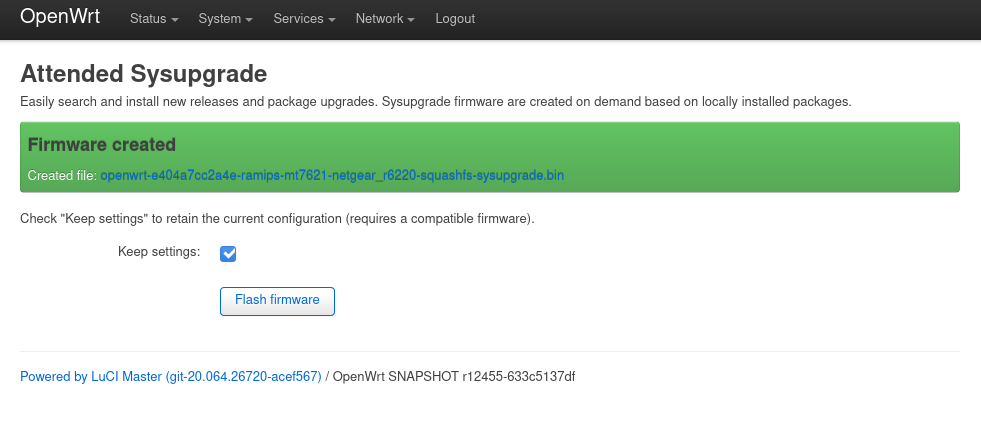This project intends to simplify the sysupgrade process of devices running
OpenWrt or distributions based on the former like LibreMesh. The provided tools
here offer an easy way to reflash the router with a new version or package
upgrades, without the need of opkg installed.
Additionally it offers an API (covered below) to request custom images with any selection of packages pre-installed, allowing to create firmware images without the need of setting up a build environment, even from mobile devices.
Simple web interface using vanilla JavaScript currently developed by @mwarning. It offers a device search based on model names and show links either to official images or requests images via the asu API. Please join in the development at the GitHub repository
The package
luci-app-attendedsysupgrade
offers a simple view under System > Attended Sysupgrade to automatically
request a new firmware, wait until it is build and flash it.
The server listens to image requests and automatically generate them if the request was valid. This is done by automatically setting up OpenWrt ImageBuilders and cache images in a Redis database. This allows to quickly respond to requests without rebuilding existing images again.
Redis is required to store image requests:
sudo apt install redis-server tar
Install asu:
pip install asu
Start the server via the following commands:
export FLASK_APP=asu # set Flask app to asu
flask janitor init # download upstream profiles/packages
flask run # run development server
Start the worker via the following comand:
rq worker
It is recommended to run ASU via gunicorn proxied by nginx. Find a
possible nginx configuration in the misc/ folder. Also the setup should not
HTTPS to allow clients without SSL/certificates to check for upgrades.
To change the default setting place a file called config.py in the root of
the instance
folder.
Find an example in the misc/ folder.
pip install gunicorn
gunicorn "asu:create_app()"
After cloning this repository create a Python virtual environment and install the dependencies:
python3 -m venv .
source bin/activate
pip install -r requirements.txt
export FLASK_APP=asu # set Flask app to asu
export FLASK_DEBUG=1 # run Flask in debug mode (autoreload)
flask run
The server does no longer offer complex upgrade but only serves static JSON files including available versions. For now the client must evaluate if the responded JSON contains a newer version.
| key | value | information |
|---|---|---|
version |
SNAPSHOT |
installed version |
profile |
netgear_wndr4300-v2 |
board_name of ubus call system board |
packages |
["luci", "vim"] |
Extra packages for the new image |
Each valid request returns a request_hash which can be used for future
polling via /api/build/<request_hash>.
A 200 response means the image was sucessfully created. The response is JSON
encoded containing build information.
| key | information |
|---|---|
bin_dir |
relative path to created files |
buildlog |
boolean if buildlog.txt was created |
manifest |
dict of all installed packages plus version |
request_hash |
hashed request data stored by the server |
{
"build_at": "Tue, 25 Feb 2020 08:49:48 GMT",
"enqueued_at": "Tue, 25 Feb 2020 08:49:09 GMT",
"id": "avm_fritzbox-4040",
"image_prefix": "openwrt-387e9d003d04-ipq40xx-generic-avm_fritzbox-4040",
"images": [
{
"name": "openwrt-387e9d003d04-ipq40xx-generic-avm_fritzbox-4040-squashfs-eva.bin",
"sha256": "8cb0d58bf672ed442f0813a1f04ec2f5edf6e2b64c8f117cb11158e19251aa0b",
"type": "eva"
},
{
"name": "openwrt-387e9d003d04-ipq40xx-generic-avm_fritzbox-4040-squashfs-sysupgrade.bin",
"sha256": "0d12ce60dd63422a63ed28f0e2a2ab2d367a407ccc32b665c28c809f3cb073f1",
"type": "sysupgrade"
}
],
"manifest": {
"ath10k-firmware-qca4019-ct": "2019-10-03-d622d160-1",
"base-files": "213-r12297-7e9c7e7b2d",
"busybox": "1.31.1-1",
"cgi-io": "17",
"dnsmasq": "2.80-18",
[...]
"uclient-fetch": "2020-01-05-fef6d3d3-1",
"uhttpd": "2020-02-12-2ee323c0-1",
"urandom-seed": "1.0-1",
"urngd": "2020-01-21-c7f7b6b6-1",
"usign": "2019-09-21-f34a383e-1",
"vim": "8.1-6",
"wireless-regdb": "2019.06.03",
"wpad-basic": "2019-08-08-ca8c2bd2-6",
"zlib": "1.2.11-3"
},
"metadata_version": 1,
"request_hash": "5bac6cb8321f",
"supported_devices": [
"avm,fritzbox-4040"
],
"target": "ipq40xx/generic",
"titles": [
{
"model": "FRITZ!Box 4040",
"vendor": "AVM"
}
],
"version_commit": "r12297-7e9c7e7b2d",
"version_number": "SNAPSHOT"
}
The client should check the status code:
| status | meaning | information |
|---|---|---|
200 |
build finish / upgrade available | see parameters above |
202 |
building, queued, imagebuilder setup | building right now or in build queue |
400 |
bad request | see error parameter |
404 |
not found | if invalid request_hash supplied via /api/build/<request_hash> |
422 |
unknown package | unknown package in request |
500 |
build failed | see log for build log |

